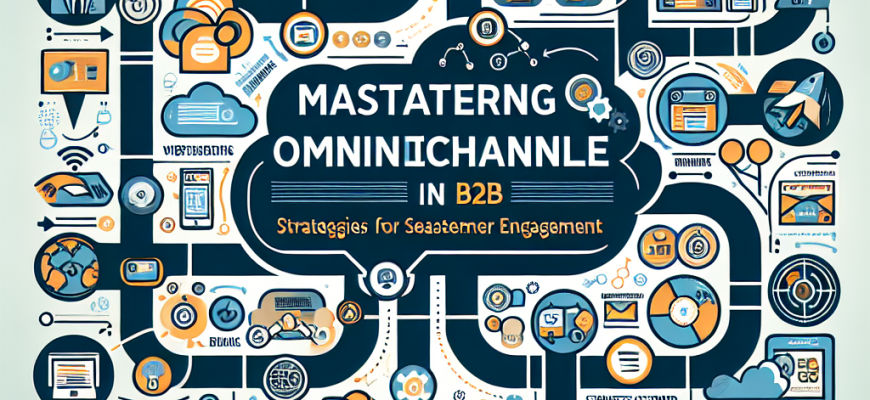Mastering Omnichannel Marketing in B2B: Strategies for Seamless Customer Engagement
In the rapidly evolving digital landscape, B2B marketers are constantly seeking innovative strategies to engage their audience. The advent of omnichannel marketing has revolutionized the way businesses interact with their customers, offering a seamless and integrated experience across various platforms and devices. As a digital marketing expert, I’ve seen firsthand the transformative power of a well-executed omnichannel strategy in fostering meaningful connections and driving business growth. In this post, we’ll delve into the core principles of mastering omnichannel marketing in the B2B sector and outline actionable strategies to enhance your customer engagement.
Understanding the Omnichannel Approach
At its heart, omnichannel marketing is about creating a cohesive and consistent brand experience for your customers, regardless of how or where they choose to interact with your business. Unlike multichannel marketing, which operates each channel in silos, omnichannel marketing integrates all channels to work in harmony, ensuring a unified brand message and experience. This approach is particularly crucial in the B2B realm, where the buying process is often more complex and involves multiple stakeholders.
Strategies for Seamless Customer Engagement
-
Customer Data Integration: The foundation of an effective omnichannel strategy lies in a deep understanding of your customers. Integrating customer data from various touchpoints—be it your website, social media, CRM, or customer support—provides a comprehensive view of your customer’s journey. Leveraging this data enables personalized and contextually relevant interactions, enhancing the customer experience.
-
Content Personalization: In the B2B sector, where the sales cycle can be lengthy and highly nuanced, personalized content can significantly impact engagement. By tailoring your content to meet the specific needs and pain points of your audience at different stages of the buying journey, you can foster stronger connections and accelerate the decision-making process.
-
Channel Optimization: Not all channels are created equal, especially in B2B marketing. Identifying and optimizing the channels most preferred by your target audience is crucial. Whether it’s LinkedIn for professional networking, email campaigns for direct communication, or industry-specific forums for thought leadership, focusing on the right channels enhances your reach and engagement.
-
Mobile Optimization: With the increasing use of smartphones in professional settings, mobile optimization is no longer optional. Ensuring that your website, emails, and content are mobile-friendly is essential for engaging the modern B2B buyer. A seamless mobile experience can significantly improve the effectiveness of your omnichannel strategy.
-
Consistent Brand Messaging: Consistency is key in omnichannel marketing. Your brand’s message, tone, and visual identity should be uniform across all channels. This consistency reinforces your brand image and helps build trust with your audience, making it easier for them to recognize and engage with your content.
-
Leveraging Technology: The complexity of omnichannel marketing demands sophisticated tools and technologies. Investing in a robust marketing automation platform can streamline your efforts, enabling efficient data integration, personalized content delivery, and performance tracking across channels. AI and machine learning can further enhance your strategy by predicting customer behavior and optimizing interactions.
- Measuring Success: To continually refine and improve your omnichannel strategy, it’s vital to measure its effectiveness. Key performance indicators (KPIs) such as engagement rates, conversion rates, customer retention, and ROI provide valuable insights into the impact of your efforts. Regularly analyzing these metrics allows you to adjust your strategy for better results.
Navigating the Challenges
While the benefits of omnichannel marketing are clear, implementing this approach comes with its challenges. Data silos, technological limitations, and organizational resistance can hinder your efforts. Overcoming these obstacles requires a commitment to digital transformation, a willingness to invest in the necessary tools, and a culture that embraces change and innovation.
The Path Forward
In the B2B sector, where the stakes are high and the competition fierce, mastering omnichannel marketing can be a game-changer. By adopting a customer-centric approach, leveraging data and technology, and fostering a culture of continuous improvement, businesses can achieve seamless customer engagement and drive sustainable growth.
Embracing omnichannel marketing is not merely about keeping up with the latest digital trends; it’s about recognizing the evolving expectations of B2B buyers and meeting them where they are. As we look to the future, the ability to deliver a cohesive and personalized brand experience across all channels will not just be a competitive advantage—it will be a necessity.
In the journey to master omnichannel marketing, the focus should always remain on the customer. By understanding their needs, preferences, and behaviors, and by delivering consistent, personalized, and engaging experiences, B2B marketers can forge deeper connections and build lasting relationships. The path to omnichannel excellence is both challenging and rewarding, but with the right strategies and mindset, it’s a journey well worth embarking on.

A seasoned digital marketing strategist with over 8 years of experience across various areas of digital marketing, including SEO, SMM, PPC, content marketing, and email marketing. Specializes in transforming B2B, B2C, e-commerce, and SaaS businesses by creating effective go-to-market strategies and building thriving digital ecosystems. Known for a data-driven approach to optimizing campaigns and maximizing results.
“If your business is looking to scale or in need of a fresh perspective, feel free to contact”.





